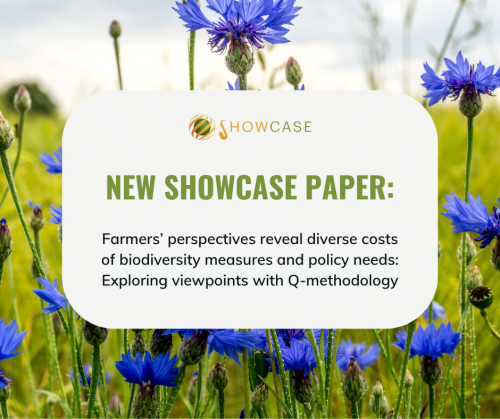A recent SHOWCASE study, carried out by partners from BOKU, Universitatea Babeș-Bolyai, the Estonian University of Life Sciences (EMU), Wageningen University (WUR) and the University of Reading, explores how farmers across Europe perceive the financial and non-financial costs of biodiversity measures within agri-environmental programs. Using Q-methodology, the researchers captured farmers’ diverse viewpoints on the burdens they face when implementing conservation actions, from economic trade-offs and lost income opportunities to administrative complexity, loss of autonomy and social pressure when nature-friendly farming challenges conventional ideas of “good farming.”
The study highlights that the success of agri-environmental programs depends on much more than financial compensation. To ensure long-term participation, policies must address the wide range of practical, emotional and social factors that shape farmers’ experiences. By revealing this diversity of perceptions, the research provides valuable insights for designing more flexible, fair and effective policies that support farmers while strengthening biodiversity conservation across Europe.
To explore how farmers across Europe perceive the financial and non-financial costs of implementing biodiversity measures, the research used Q-methodology. This approach identifies shared viewpoints among farmers by having them sort and rank statements about their experiences, revealing the diverse burdens they face, from economic losses and administrative challenges to emotional and social pressures. The study, conducted in Estonia, the Netherlands, Romania and the UK, provides a nuanced understanding of these multi-faceted costs, offering valuable insights for designing more targeted and effective agri-environmental policies that reflect farmers’ realities and support long-term biodiversity conservation.
The SHOWCASE study identified a wide range of financial, management-related, emotional and social costs that farmers associate with implementing biodiversity measures, showing that these costs are deeply interconnected and vary greatly between individuals. Importantly, the study highlights that one-size-fits-all agri-environmental policies are unlikely to succeed. Instead, policymakers should develop more flexible, farmer-centered approaches, such as result-based payments, collective schemes and diverse contract options, that account for farmers’ varied motivations and perceived burdens. By aligning policy design with these diverse viewpoints, the EU and member states can improve both the fairness and effectiveness of biodiversity conservation efforts.
Read the full study here.
